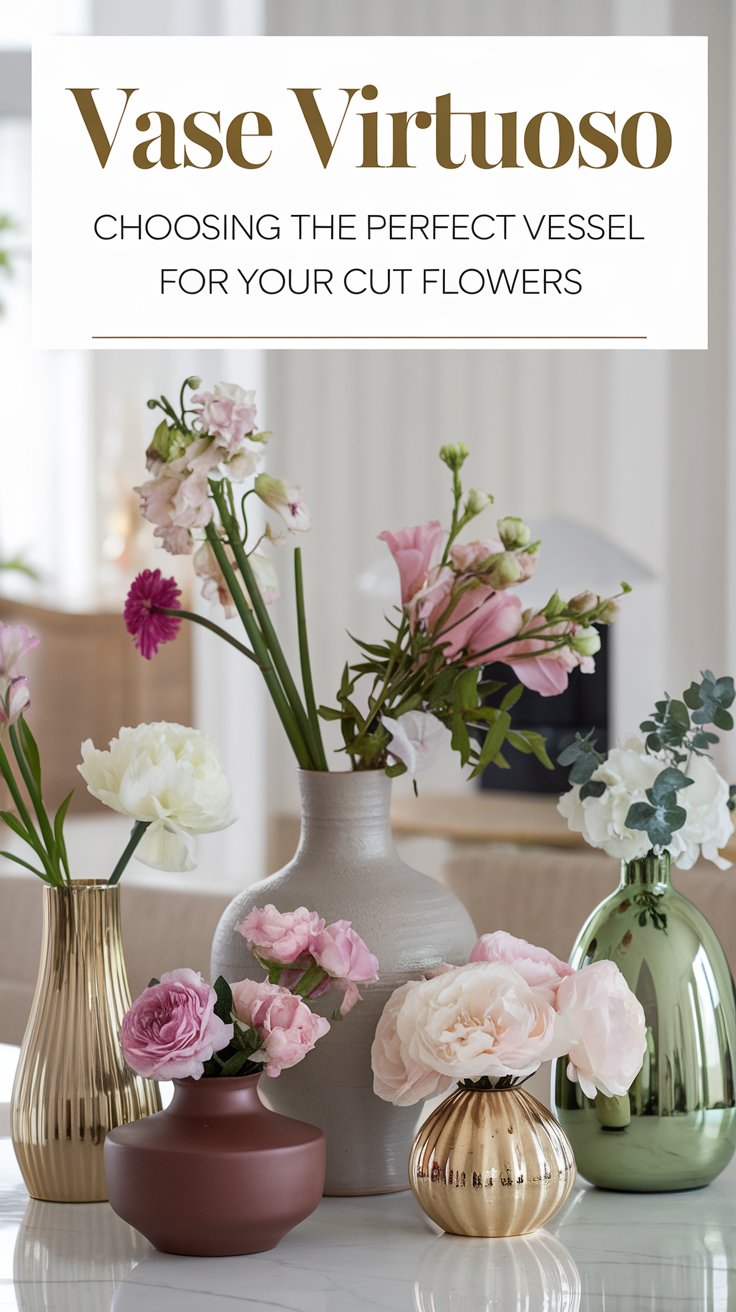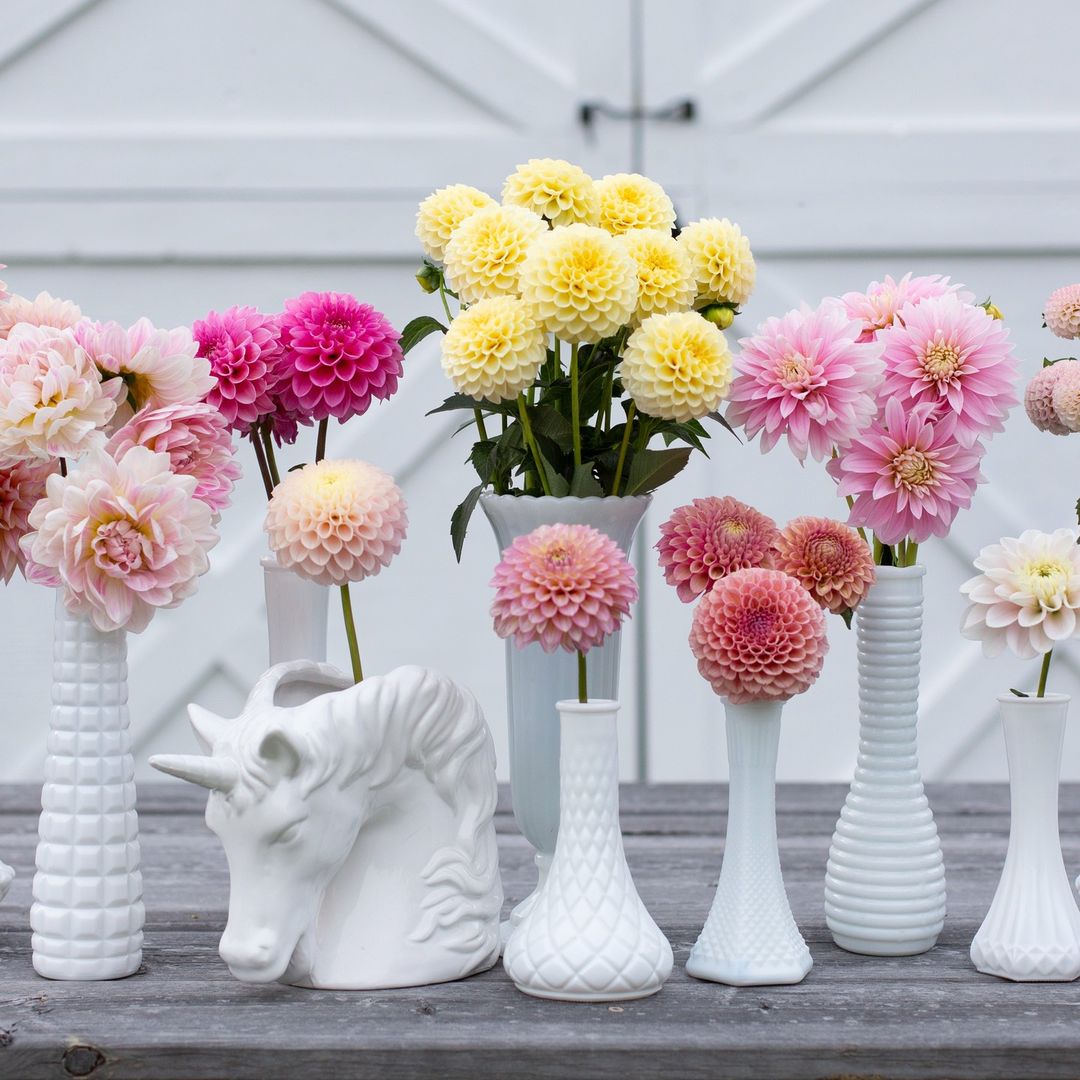Elevate your floral display with the ideal vase. Discover how shape, size and material impact flower longevity and arrangement aesthetics. Learn to match vases to flower types for stunning results. Click for expert tips on selecting vases that make your cut flowers shine.
The right vase can make or break your floral arrangement. It’s not just about looks – the shape, size, and material of your vase can significantly impact the longevity and appearance of your cut flowers. In this guide, we’ll explore how to choose the perfect vessel for your blooms, ensuring they look their best and last longer.
Why Vase Selection Matters

- Supports flower stems properly
- Affects water uptake and flower longevity
- Enhances the overall aesthetic of your arrangement
- Complements your home décor
Vase Shapes and Their Ideal Flowers

1. Cylinder Vases
Best for: Long-stemmed flowers like roses, lilies, and sunflowers
Characteristics
- Tall and straight
- Provides good support for heavy blooms
- Allows for easy arranging
Pro Tip: Choose a height that allows about 1/3 of the total flower length to extend above the vase.
2. Bubble Vases
Best for: Flowers with full, round blooms like peonies or hydrangeas
Characteristics
- Wide, rounded body with a narrower neck
- Supports large flower heads
- Creates a gathered, abundant look
Pro Tip: Fill these vases only 1/3 full of water to prevent stem rot.
3. Bud Vases
Best for: Single stems or small clusters of delicate flowers
Characteristics
- Small and narrow
- Perfect for minimalist arrangements
- Ideal for short-stemmed flowers
Pro Tip: Use odd numbers of bud vases grouped together for a modern look.
4. Flared Vases
Best for: Flowers that fan out naturally like tulips or daffodils
Characteristics
- Wider at the top than the bottom
- Allows flowers to spread naturally
- Good for mixed bouquets
Pro Tip: Start arranging from the outside and work your way in for a balanced look.
5. Square or Rectangular Vases
Best for: Modern, structured arrangements
Characteristics
- Geometric shape adds visual interest
- Good for grid-style arrangements
- Works well with tropical flowers
Pro Tip: Use clear tape to create a grid on top of the vase for easier arranging.
Vase Sizes and Flower Proportions
Small Vases (under 8 inches)
- Ideal for: Short-stemmed flowers, single blooms, or small bouquets
- Examples: Violets, pansies, small roses
Medium Vases (8-12 inches)
- Ideal for: Mixed bouquets, medium-stemmed flowers
- Examples: Tulips, daisies, carnations
Large Vases (over 12 inches)
- Ideal for: Long-stemmed flowers, dramatic arrangements
- Examples: Sunflowers, lilies, gladiolus
Pro Tip: As a general rule, the length of the flower stems should be about 1.5 to 2 times the height of the vase.
Vase Materials and Their Impact
1. Glass
- Pros: Versatile, easy to clean, shows water level
- Cons: Can be fragile, may allow too much light to roots
- Best for: Most flower types, especially good for transparent designs
2. Ceramic
- Pros: Sturdy, comes in various colors and designs
- Cons: Can be heavy, opaque (can’t see water level)
- Best for: Traditional arrangements, rustic or country-style décor
3. Metal
- Pros: Durable, modern look
- Cons: Can affect water temperature, may react with certain flowers
- Best for: Contemporary designs, outdoor use
4. Plastic
- Pros: Lightweight, unbreakable, often inexpensive
- Cons: May look less premium, can retain bacteria if not cleaned properly
- Best for: Casual arrangements, children’s rooms, outdoor events
Pro Tip: For a cohesive look, choose vase materials that complement your home’s existing décor.
Matching Vases to Flower Types
Roses
- Ideal Vase: Tall cylinder or slightly flared
- Why: Provides support for heavy blooms and long stems
Tulips
- Ideal Vase: Flared or straight, medium height
- Why: Allows for natural curve of stems, supports continued growth
Hydrangeas
- Ideal Vase: Wide-mouthed, short to medium height
- Why: Supports large, heavy blooms and allows for a full, rounded arrangement
Orchids
- Ideal Vase: Tall, narrow cylinder or specialty orchid vases
- Why: Supports delicate stems and allows for proper air circulation
Wildflowers
- Ideal Vase: Mason jars or rustic pitchers
- Why: Complements the casual, natural look of wildflowers
Vase Care and Maintenance
- Clean thoroughly between uses with hot, soapy water
- Disinfect occasionally with a solution of 1 part bleach to 10 parts water
- Dry completely before storing to prevent mold growth
- Store in a dust-free area to keep them ready for use
Pro Tip: Keep a variety of vase shapes and sizes on hand to accommodate different types of flowers and arrangements.
Creative Vase Alternatives
Think outside the box with these unique vessel ideas:
- Vintage teapots for cottage-style arrangements
- Wine bottles for single stems or small bouquets
- Hollowed-out fruits or vegetables for themed events
- Recycled tin cans for a rustic, eco-friendly look
- Clear glass bowls for floating flower arrangements
Choosing the right vase is an art that can significantly enhance the beauty and longevity of your cut flowers. By considering the shape, size, and material of your vase in relation to your flowers, you can create stunning arrangements that perfectly complement your space.
Remember, the perfect vase not only showcases your flowers but also reflects your personal style. Don’t be afraid to experiment with different combinations to find what works best for you and your blooms.
For more flower arranging tips, visit the American Institute of Floral Designers website
Learn about sustainable floristry practices from the Slow Flowers Society
Happy arranging, and may your vases always be filled with beautiful blooms!
For more gardening tips and plant care guides, visit usagardenhub.com.
